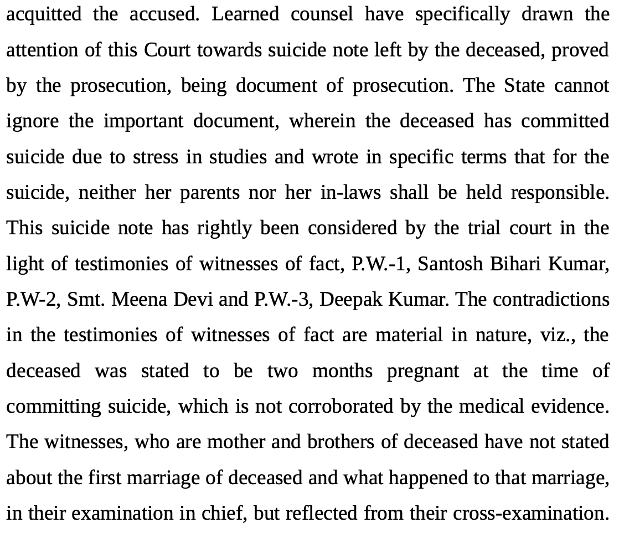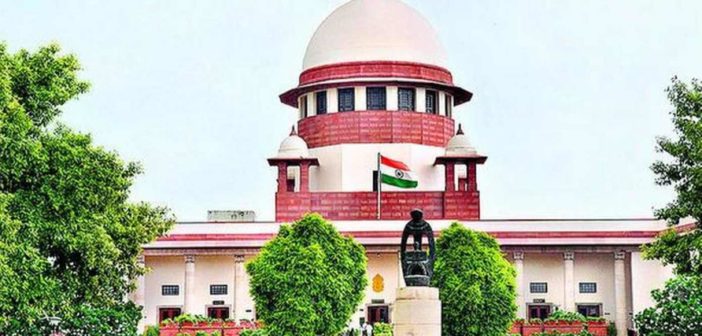In this edition of court judgements review, we look into the Supreme Court’s orders that a victim’s credible testimony is sufficient for rape conviction despite no external injuries, that promise to marriage & subsequent relationship based on consent won’t amount to rape, that employer has duty to reasonably accommodate employee who acquires disability during service, among others.
Supreme Court: Victim’s Credible Testimony Sufficient for Rape Conviction Despite No External Injuries
In the case of Deepak Kumar Sahu vs. State of Chhattisgarh, the Supreme Court has ruled that a conviction for rape can be based on the sole testimony of the victim, even if a medical examination does not reveal external injuries. The Court underscored that a credible and consistent account from the victim is of paramount importance and does not require corroboration, particularly when such corroboration might not be available. The petitioner, Deepak Kumar Sahu, was convicted for offences under Section 450 and Section 376(2) of the Indian Penal Code, as well as under the POCSO Act, since the victim was a minor aged 15 years and 5 months.
The appeal was filed by the convicted individual, who challenged the High Court’s decision to uphold his conviction. The defence had argued that the absence of external injuries on the victim, alleged discrepancies in witness statements, and the claim that the prosecution could not establish that the victim was a minor should lead to his acquittal. The challenge to the victim’s age was a key point, as it sought to question the applicability of the stringent POCSO Act.
However, the bench, consisting of Justices Sudhanshu Dhulia and N.V. Anjaria, found the victim’s testimony to be clear and trustworthy. The Court stressed that minor inconsistencies are common in such cases and do not automatically render a victim’s account unreliable. It reiterated the legal principle that a victim’s evidence should be given the same weight as that of an injured witness in other criminal cases, thereby dismissing the argument that a lack of medical evidence or injuries could automatically discredit her testimony. The ruling serves to strengthen the legal framework for victims of sexual assault and reinforce the judiciary’s commitment to delivering justice.
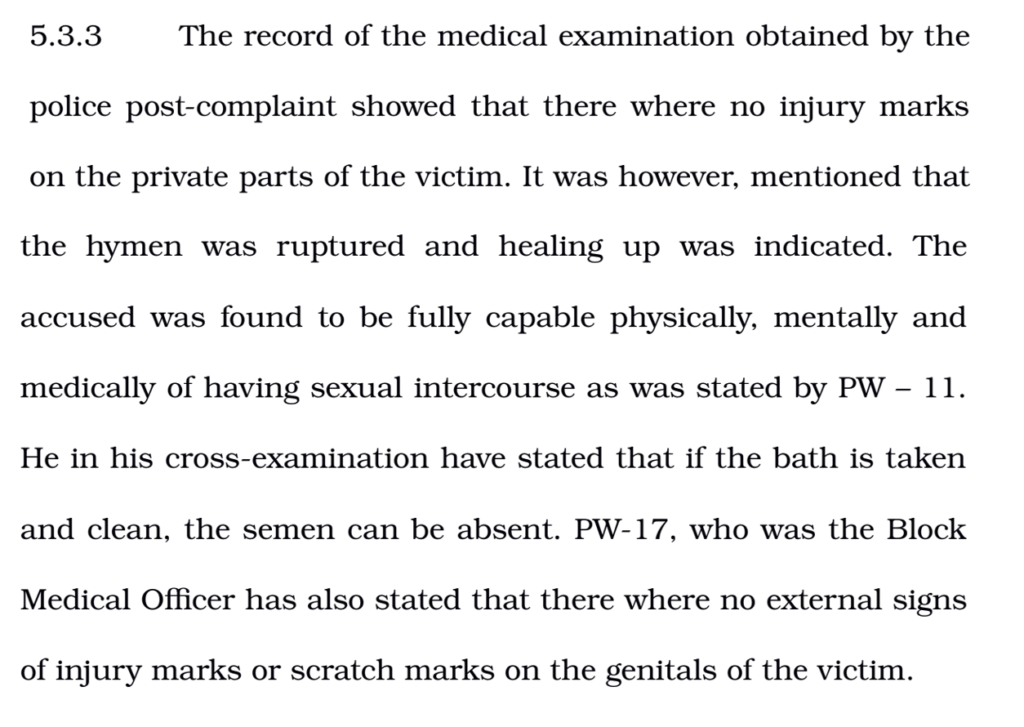
Supreme Court: Promise To Marriage & Subsequent Relationship Based on Consent Won’t Amount to Rape
In a significant order in the case of Kunal Chatterjee vs. The State of West Bengal & Ors., the Supreme Court quashed a criminal proceeding, including charges under the POCSO Act, against an appellant. The Court ruled that a consensual physical relationship based on a promise of marriage does not constitute rape, especially when there is no forensic evidence and a significant delay in filing the FIR.
The appellant, Kunal Chatterjee, was an accused under Sections 417, 376, and 506 of the Indian Penal Code, and Section 6 of the POCSO Act. The complainant, a prosecutrix who was a major at the time of the FIR, alleged that she was a minor (15 years old) when she and the appellant had a consensual relationship based on his promise to marry her. The FIR was lodged after the appellant allegedly backed out of the marriage promise, over three years after the alleged sexual act.
The appellant had sought to quash the FIR in the Calcutta High Court. While the High Court quashed the proceedings against the appellant’s father, mother, and uncle, it kept the proceedings against the appellant alive. The appellant then appealed to the Supreme Court.
The Supreme Court, consisting of Justices Sudhanshu Dhulia and Aravind Kumar, observed that while the State argued that the consent of a minor is no consent, there was “absolutely no evidence, and definitely no forensic evidence” of rape. The Court stated that the long delay in lodging the FIR, more than three years after the alleged incident, suggested that the criminal proceedings were an abuse of the legal process. Citing several decisions, the Court reiterated that a promise to marry followed by a consensual physical relationship does not amount to rape. The appeal was allowed, and the proceedings against the appellant were quashed.
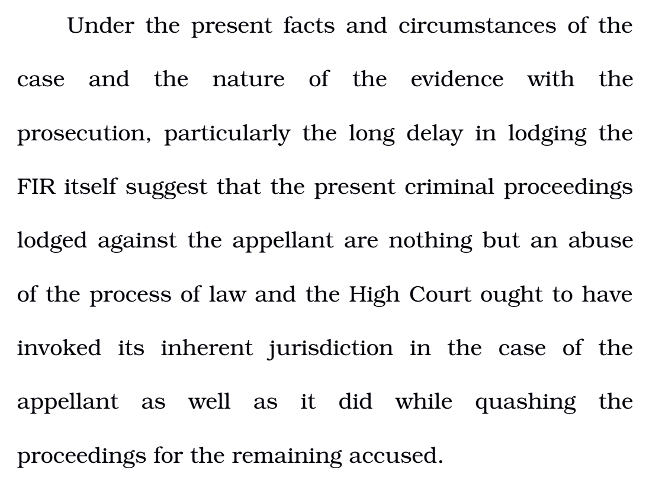
Supreme Court: Employer Has Duty to Reasonably Accommodate Employee Who Acquires Disability During Service
In the case of Ch. Joseph vs. The Telangana State Road Transport Corporation & Other, the Supreme Court ruled that an employer has a constitutional and statutory obligation to provide reasonable accommodation and alternate employment to an employee who acquires a disability during their service. The Court set aside a High Court judgment and directed the Telangana State Road Transport Corporation (TSRTC) to reinstate a driver who had been retired due to colour blindness.
The appellant, Ch. Joseph, was a driver for TSRTC who was found to be colourblind during a routine medical check-up. He was subsequently declared medically unfit to be a driver and was retired from service without being offered any alternate employment. The corporation had rejected his request for an alternate job, arguing that its rules did not provide for such an option for colourblind drivers.
The Supreme Court, with Justices J.K. Maheshwari and Aravind Kumar, identified several key flaws in the corporation’s actions. It found that a 1979 Memorandum of Settlement (MOS) was still binding and specifically provided for alternate employment with pay protection for drivers who became colour blind. This settlement, which has statutory force, was not superseded by a later 1986 settlement or internal circulars. The Court emphasised that the corporation made no genuine effort to explore alternative employment options for the appellant. It held that colour blindness, while a disqualification for driving, does not render an employee unfit for all public service. The bench stressed that the duty to reasonably accommodate employees with acquired disabilities is rooted in the constitutional principles of non-discrimination and equality under Articles 14 and 21. It clarified that an employer cannot bypass this obligation by drawing rigid distinctions between recognised and unrecognised disabilities under statutory frameworks like the Persons with Disabilities Act, 1995. The Court concluded that the corporation’s decision to retire the appellant was a “substantive illegality” that violated his right to livelihood and equal treatment. It ordered TSRTC to reinstate Ch. Joseph in a suitable post with the same pay grade, grant him 25% of his back wages, and consider the intervening period as continuous service.

Rajasthan HC: Minor Rape Victim’s Consent to Be Heard Over Parents’, Pregnancy Termination Denied
In the case of Victim vs. State of Rajasthan & Ors., the Rajasthan High Court rejected a father’s petition to terminate his minor daughter’s pregnancy, prioritising the victim’s own wishes. The court ruled that the victim’s consent takes precedence over her parents’, establishing a crucial precedent for a woman’s right to reproductive autonomy under Article 21.
The 17-year-old victim became pregnant because of rape and was 22 weeks along when her father filed the petition. However, through a letter to the court and a statement to a counsellor, the victim herself expressed her clear desire to continue the pregnancy, stating that her father’s petition was filed without her consent. She further alleged a harsh and abusive relationship with her parents and wished to reside at a Child Welfare Committee until she becomes a major at 18.
Justice Anoop Kumar Dhand, presiding over the case, noted that while the Medical Termination of Pregnancy (MTP) Act, 1971, requires a guardian’s consent for a minor, it does not address situations where the minor’s wishes conflict with her guardian’s. The Court, referencing Supreme Court precedents like A (Mother of X vs. State of Maharashtra) and Suchita Srivastava vs. Chandigarh Administration, which established that a minor’s views are an “important factor” in such decisions. The bench determined that the victim, being over 17 and demonstrating maturity, had the right to make her own choice, and that the unborn child also has a right to life under Article 21.
The court denied the petition to terminate the pregnancy, given the victim’s wishes and no immediate health threat. It directed the state to provide medical and personal care, including a safe stay at a Child Welfare Committee, educational facilities if she chooses to study, educational facilities, and strict privacy for the victim and newborn.
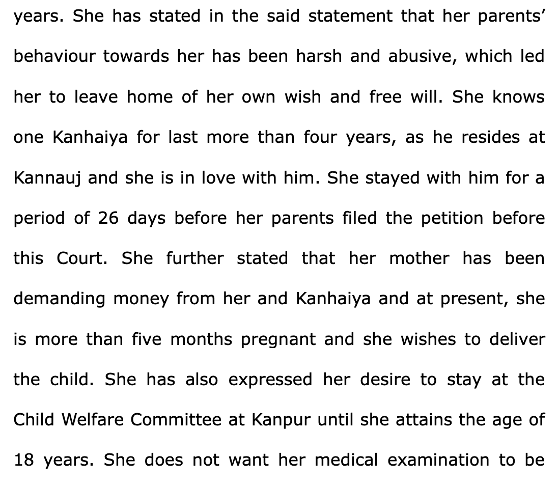
Allahabad HC: UP Govt to Pay ₹2 Lakh Compensation for ‘Vexatious’ Dowry Death Appeal
In the case of State of U.P. vs. Dhirendra Kumar S/O Nand Kishor Jaiswal, the Allahabad High Court dismissed a government appeal against an acquittal in a dowry death case, criticising the state for filing a “vexatious criminal prosecution”. The Court ordered the Uttar Pradesh government to pay a compensation of ₹2 lakh to the accused within 30 days, who was “honourably acquitted” by the trial court.
The accused, Dhirendra Kumar, had been acquitted by the trial court on charges including dowry death, with the prosecution alleging he had tortured his wife, Pinky Kumari, for dowry, leading to her suicide.
However, the High Court upheld this acquittal, giving significant weight to a suicide note found with the deceased, Pinky Kumari. The note, proven to be in her handwriting, explicitly stated she was committing suicide due to “study stress” and absolved her husband, in-laws, and parents of any blame.
The Court also noted that the prosecution’s claim of dowry demands was based on “vague statements” from witnesses, and the post-mortem report falsified the claim that the deceased was pregnant. Furthermore, the deceased’s brother, the primary informant, was with her a day before she died, and the accused was not present at the time of her death, as he had travelled to Delhi with his mother due to her illness. The Court emphasised that in cases of acquittal, there is a “double presumption of innocence” for the accused. It concluded that the state’s appeal was an abuse of the legal process and that the government had not applied its mind properly before filing it.
